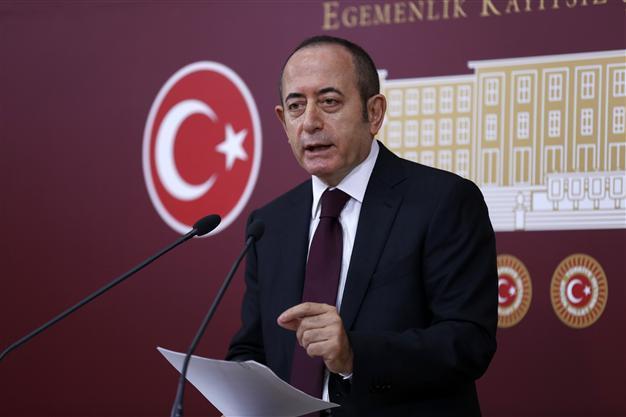Turkish opposition stands firm in Ottoman language row
ANKARA

The main opposition Republican People’s Party (CHP) has questioned both President Recep Tayyip Erdoğan’s motives and authority with regard to his engagement in the possible inclusion of Ottoman language classes in Turkey’s high school curriculum.
“You are not the prime minister or in the government anymore,” CHP Deputy Parliamentary Group Chair Akif Hamzaçebi said on Dec. 9, referring to President Erdoğan’s recent vow that the Ottoman language classes will be introduced “no matter what they say.”
“These issues are not in your jurisdiction and you should not talk about these issues. You may voice your view, but speaking in such imperatives is not legally appropriate,” Hamzaçebi said.
For her part, CHP Istanbul deputy Binnaz Toprak asked the Turkish prime minister why he did not learn the Ottoman language if it is so “important for the education of high school students.”
Speaking at a press conference in Ankara, Toprak said: “I learned the Ottoman language but I have forgotten it because I have not used it for a while. Davutoğlu is an old student of mine. He has a good education. If this is really so important, then why he didn’t learn the Ottoman language?”
Meanwhile, Peoples’ Democratic Party (HDP) co-leader Selahattin Demirtaş also slammed the government’s apparent intention to introduce Ottoman language courses as compulsory courses.
“What is the use of imposing? You ban people from teaching their mother tongue. You say ‘Mother tongue education is banned,’” Demirtaş said in an interview with daily Bugün on Dec. 9.
According to recommendations of the National Education Council, which ended its annual meeting over the weekend, Ottoman language classes should be compulsory for imam-hatip religious vocational high schools and offered as an elective course for other high schools.
Delivering a speech at the 5th Religion Council hosted by the Directorate General of Religious Affairs (Diyanet) in Ankara on Dec. 8, Erdoğan issued a staunch defense of the suggestions. “There are those who don’t want Ottoman [language] to be learned and taught. This is a very great danger. But whether they want it or not, Ottoman will be learned and taught in this country,” he vowed.
Alphabet and impositionFor his part, Education Minister Nabi Avcı proposed on Dec. 9 the drafting of a “reading list for all” as a measure to calm down the ongoing debate.
Avcı objected to the “shape of the debate,” which he described as “unhealthy.”
“We need to form a joint framework of references so that our opposition and columnists can resume the debate in a healthy way. As the education minister, my proposal is to draft a reading list so that we can better understand what each of us says,” he said.
However, CHP Deputy Parliamentary Group Chair Hamzaçebi said the real aim by making Ottoman language courses “compulsory” was to “settle accounts with secularism, the Republic, Republic’s fundamental values and modernization.”
He also claimed that Erdoğan was planning to introduce use of the Arabic alphabet instead of the current Turkish alphabet.
In 1928, as part of early republican modernization reforms, Mustafa Kemal Atatürk, the founder of the Turkish Republic, issued a decree replacing the Arabic script with a version of the Latin alphabet.
According to HDP co-leader Demirtaş, the biggest mistake that the AKP has made on this issue is making an “imposition,” while stressing that he is not against his daughters being taught Ottoman.
“Even if your entire army comes, they cannot forcefully teach my daughters Ottoman … Imposition itself is the problem,” he said.
 The main opposition Republican People’s Party (CHP) has questioned both President Recep Tayyip Erdoğan’s motives and authority with regard to his engagement in the possible inclusion of Ottoman language classes in Turkey’s high school curriculum.
The main opposition Republican People’s Party (CHP) has questioned both President Recep Tayyip Erdoğan’s motives and authority with regard to his engagement in the possible inclusion of Ottoman language classes in Turkey’s high school curriculum.